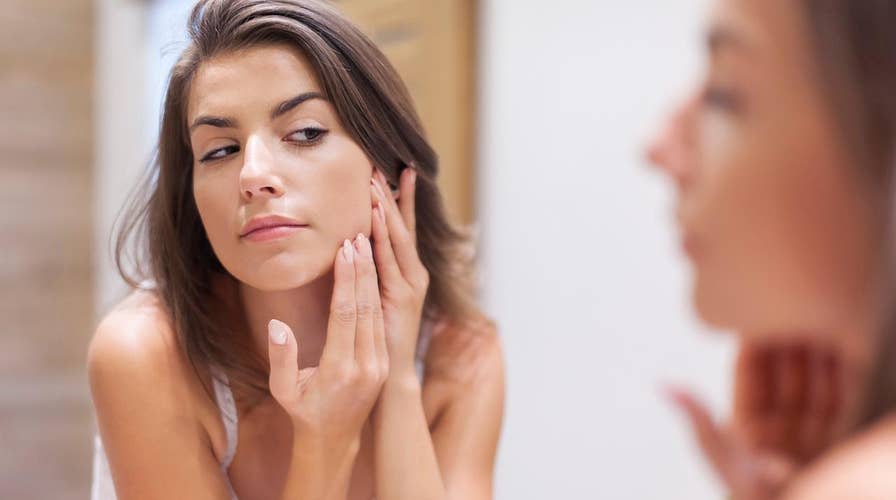How probiotics can clear up your skin problems
Probiotics, the “good” live bacteria that helps keep your gut healthy, has been shown to support a healthy immune system, boost weight management and even improve your mental health. But dermatologist and author Dr. Whitney Bowe explains there's also a connection between a healthy gut and clear, radiant skin. She sits down with Fox News’ Dr. Manny Alvarez to show how we can incorporate these “helpful” bacteria into our lives to get great skin from the inside out and outside in.
You have probably heard that probiotics, the “good” live bacteria, helps keep your gut healthy. A considerable amount of research has also shown they can help support a healthy immune system, boost weight management and even improve your mental health. But one New York City dermatologist claims the “helpful” bacteria can even lead to clear, radiant skin.
“There’s ground breaking new science showing that the gut and the skin are intimately connected,” Dr. Whitney Bowe, a dermatologist and author of “The Beauty of Dirty Skin” told Fox News. “People don’t realize we have live bacteria covering our skin and swimming through our intestines and if we find a way to harness the power of these microscopic warriors we can do magnificent things with the skin. They can target things like acne, rosacea, eczema, premature aging, and skin cancer.”
In her book, Bowe describes how your gut’s microbial inhabitants, also referred to as your intestinal flora, are workhorses.
“They assist with digestion and the absorption of nutrients: you can’t nourish yourself effectively without them,” she said.

Dermatologits, Dr. Whitney Bowe explains the connection between a healthy gut and clear, radiant skin.
“Because gut bacteria can control certain immune cells and help manage the body’s inflammatory pathways, it is said that the gut (including its inhabitants) is akin to your immune system’s largest ‘organ.’ Gut bacteria may ultimately affect your risk of all manner of chronic afflictions…[including] dermatological issues,” she explained.
The global skin care products market is projected to reach $177 billion by 2024, according to a new report by Grand View Research, Inc. Bowe said her patients often think they have to spend a fortune on expensive creams and procedures to get gorgeous skin, but realistically those avenues are like putting a Band-Aid on.
“They’re not getting to the root of the issue, if you want to get to the source of the problem you really have to think about what you’re eating, what your putting into your body and the health of your gut. An inflamed gut shows up as inflammation of the skin,” she said.
To start introducing probiotics into your life, begin adding certain foods and beverages, a daily probiotic supplement and then skin care products if you want to target a specific skin issue, Bowe said.
“When it comes to your diet you want to start incorporating foods like yogurt, kimchi, sauerkraut, sipping on some kombucha, that’s a fermented tea,” Bowe said. “If you’re somebody who likes to use say protein powder in your shake or smoothie, you want to look for the words ‘fermented’ on the label.”

Dr. Whitney Bowe sits down with Fox News’ Dr. Manny Alvarez to show how you can incorporate “helpful” bacteria into your life to get great skin from the inside out and outside in.
For a daily supplement, Bowe warns that starting with a high dosage could lead to uncomfortable gas if you introduce too many probiotics at once. Aim for 10 to 15 billion CFU each daily, Bowe recommended.
Since your gut contains trillions of bacteria, there are different bacteria strains that can address specific health issues. You can look for supplements that contain certain bacterial strains that are good for acne or other conditions like eczema, but Bowe’s believes diversity is key.
“We know that the more strains we incurporate in both our diet and in our skin care, the better,” she said.
Skin products are also finding their way into the probiotic industry. While research on topical probiotics is still in its infancy stage, Bowe has been testing and vetting such products to find out which ones really work.
“Using a probiotic topical not only provides a protective shield, preventing harmful bugs in your environment from taking hold and causing infection, but also triggers the production of natural moisturizers in the skin, keeping the skin barrier healthy,” she said.
For more information and probiotic recommendations visit DrWhitneyBowe.com.








































